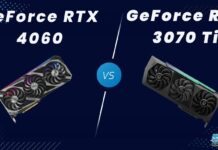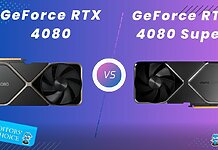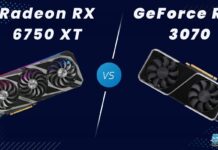Intel Core i7 12700H
Rated: 9/10
AMD Ryzen 7 7840U
Rated: 7.5/10
Pros And Cons
| CPU | Pros | Cons |
|---|---|---|
| Core i7 12700H | ✅ Better Multicore Performance ✅ Better Core Count | ❌ Older Model ❌ Lower Turbo Frequency |
| Ryzen 7 7840U | ✅ Integrated Graphics ✅ More Power Efficient | ❌Lesser Cores ❌Worse Multicore Performance |
- In our benchmarks, the Ryzen 7 7840U exhibits a slight 5.9% lead in specific benchmarks, making it a suitable option for users who value quick execution of individual tasks and applications.
- Moreover, we also found that the Core i7 12700H shines with a remarkable 12.4% advantage in specific benchmarks.
- With an astonishing memory support of up to 256GB, the Ryzen 7 7840U is well-equipped to handle memory-intensive applications, catering to users dealing with data-driven tasks.
- We discovered that the Ryzen 7 7840U offers a broader TDP range of 15-30W, granting users greater control over power efficiency compared to the Core i7 12700H’s 35-54W range.
Comparison Table
| Key Specifications | Core i7 12700H | Ryzen 7 7840U |
|---|---|---|
| Vendor | AMD | AMD |
| Release Date | January 4, 2023 | May 3, 2023 |
| Device Type | Laptop | Laptop |
| Instruction Set | x86-64 | x86-64 |
| Integrated GPU | Iris Xe Graphics (96EU) | Radeon 780M |
| Performance Cores | 6 | 8 |
| Performance Threads | 12 | 16 |
| Total Cores | 14 | 8 |
| Total Threads | 20 | 16 |
| L1 Cache | 80K (per core) | 64K (per core) |
| L2 Cache | 1280K (per core) | 1MB (per core) |
| L3 Cache | 24MB (shared) | 16MB (shared) |
| Socket | BGA-1744 | FP8 |
| Cuda Cores | 768 | 768 |
| Execution Units | 96 | 12 |
| PCI Express Version | Gen 4.0 | Gen 4.0 |
Architectural Differences
- Process Node: In the realm of semiconductor fabrication, the Core i7 12700H harnesses the power of the 10nm process node, while the Ryzen 7 7840U boasts a smaller 4nm process node, exemplifying their cutting-edge manufacturing techniques.
- Clock Speed: As the core of these processors, the Core i7 12700H comes with a Base Clock of 2.3 GHz and a Boost Clock of 4.7 GHz, counterpointed by the Ryzen 7 7840U’s 3.3 GHz Base Clock and a Boost Clock of 5.1 GHz.
- Memory Support Variation: When it comes to memory capacity, the Core i7 12700H welcomes up to 64GB, while the Ryzen 7 7840U boasts a higher number of up to 256GB, underlining its prowess in handling memory-intensive tasks and workloads.
- TDP: In the domain of power efficiency, the Core i7 12700H waltzes within the configurable confines of 35-54W TDP, while the Ryzen 7 7840U performs its intricate moves with grace, operating in the range of 15-30W TDP.
- Supported Technologies: The realm of supported technologies showcases a dichotomy. While the Core i7 12700H lacks ECC memory support, the Ryzen 7 7840U stands equipped with this precision-enhancing feature, catering to users with critical computing demands.
Prepare to dive into a realm of technological rivalry as we delve into the face-off between the Core i7 12700H vs Ryzen 7 7840U. Buckle up for a thorough exploration of their inner workings, from specs to performance benchmarks. Join us on a journey that goes beyond the numbers, providing valuable insights into the technological differences that shape their computing capabilities.
Performance Benchmarks
Now, let’s shift our focus to the performance benchmarks. We can uncover the substantial outcomes of their architectural disparities by subjecting these processors to several rigorous benchmark tests.
Cinebench R23 (Single-Core)
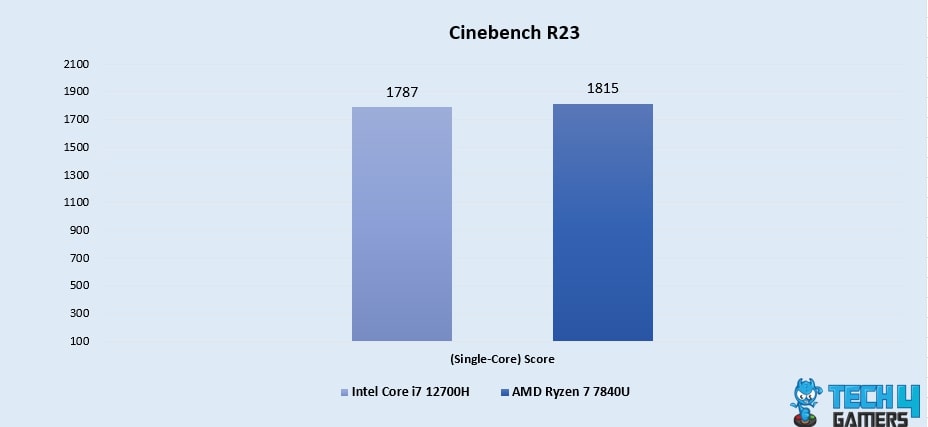
- In our Cinebench single-core performance, the Core i7 12700H showcases a disadvantage with a score of 1787, while the Ryzen 7 7840U comes closely with a performance only 1.5% higher at 1815, showcasing their nuances.
Cinebench R23 (Multi-Core)
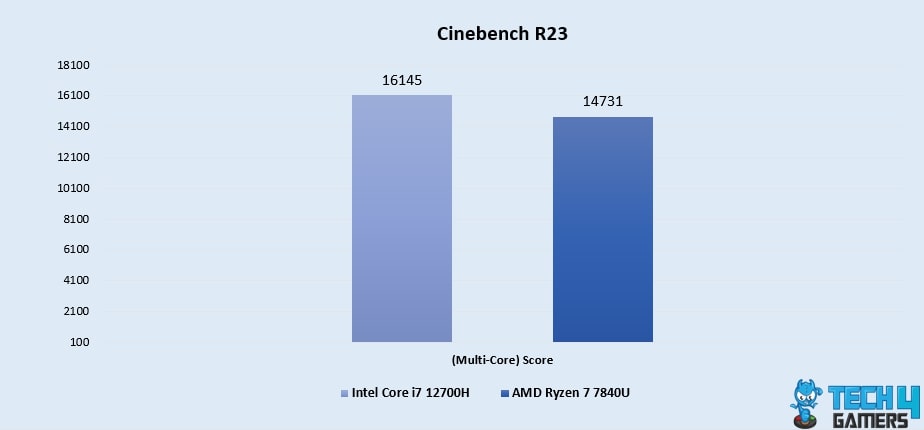
- As for multi-core benchmarks, we see that the Core i7 12700H takes centre stage, conducting a performance advantage with a commanding 9.1% lead, boasting a notable 16145 score against the Ryzen 7 7840U’s 14731.
Geekbench 5 (Single-Core)
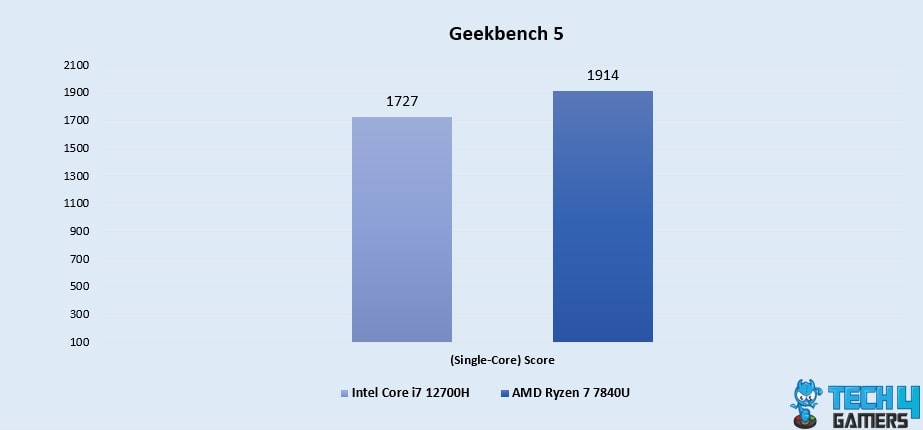
- In the realm of single-core Geekbench 5 metrics, the Core i7 12700H articulates its capabilities with a score of 1727, while the Ryzen 7 7840U responds with a 10.2% higher note, achieving 1914 in a balanced display.
Geekbench 5 (Multi-Core)
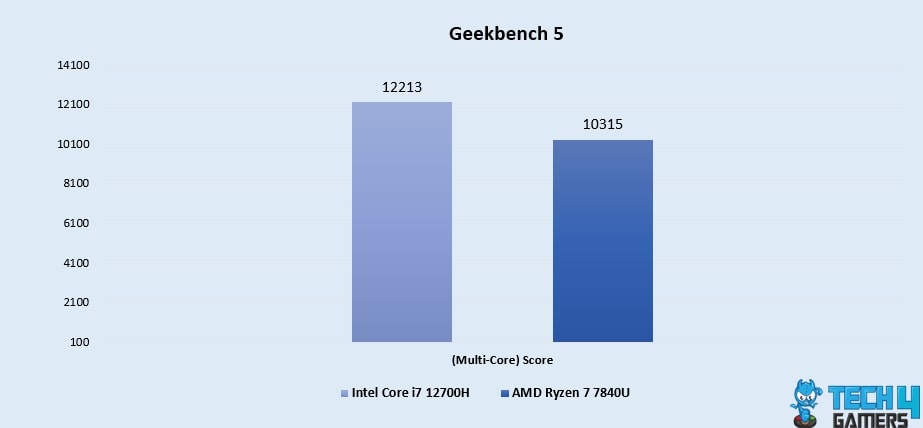
- In the multi-core domain of Geekbench 5, the Core i7 12700H maintains its stride with a 16.8% lead, achieving 12213, while the Ryzen 7 7840U contributes with a score of 10315, underlining their multi-threaded performance distinctions in our benchmarks.
Ryzen 7 7840U Vs Core i7 12700H: Which Chip Is Suitable For You?
Ryzen 7 7840U: If you prioritize single-core responsiveness, we would suggest the Ryzen 7 7840U as it holds a slight 5.9% lead in certain benchmarks. While both chips provide configurable TDPs, we found that the Ryzen 7 7840U offers a wider range of TDPs as compared to its rivals.
Intel Core i7 12700H: Moreover, for users handling multi-core workloads, our benchmarks yielded the Core i7 12700H at the top as it takes the lead with a notable 12.4% advantage in specific benchmarks, showcasing its prowess in handling resource-intensive scenarios and multitasking demands.
We would recommend the AMD Ryzen 7 7840U for its staggering memory support and finer TDP range, with the added convenience of better Integrated Graphics.
More From Intel Core i7 12700H:
More From Ryzen 7 7840U:
Thank you! Please share your positive feedback. 🔋
How could we improve this post? Please Help us. 😔
[Comparisons Expert]
Shehryar Khan, a seasoned PC hardware expert, brings over three years of extensive experience and a deep passion for the world of technology. With a love for building PCs and a genuine enthusiasm for exploring the latest advancements in components, his expertise shines through his work and dedication towards this field. Currently, Shehryar is rocking a custom loop setup for his built.
Get In Touch: shehryar@tech4gamers.com


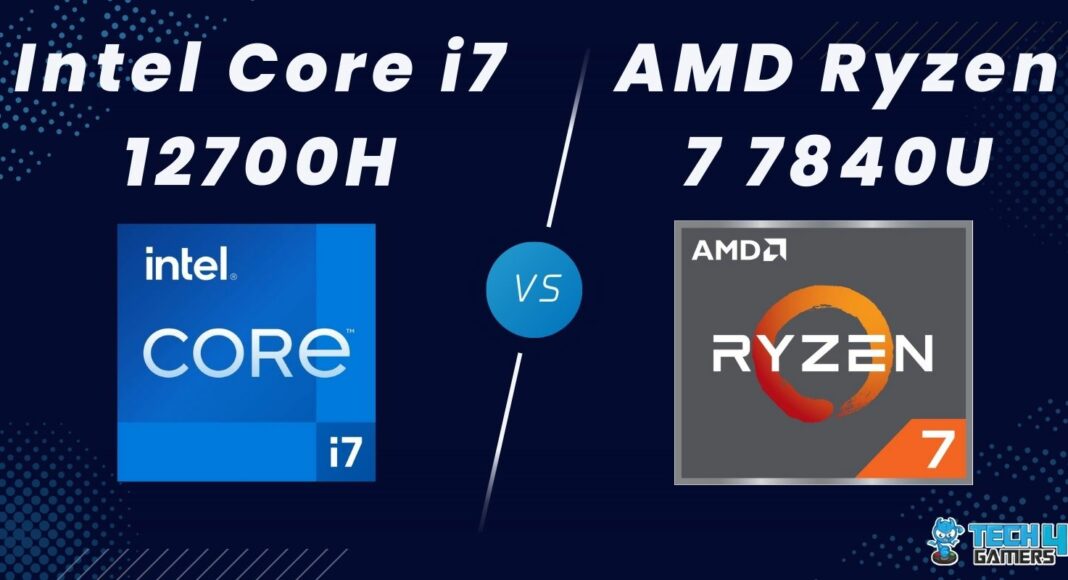
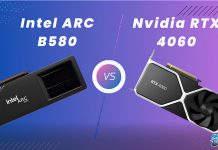
![Core i9-13900KF Vs Ryzen 9 7900X3D [We Tested Both]](https://tech4gamers.com/wp-content/uploads/2023/03/Core-i9-13900KF-vs-Ryzen-9-7900X3D-218x150.jpg)
